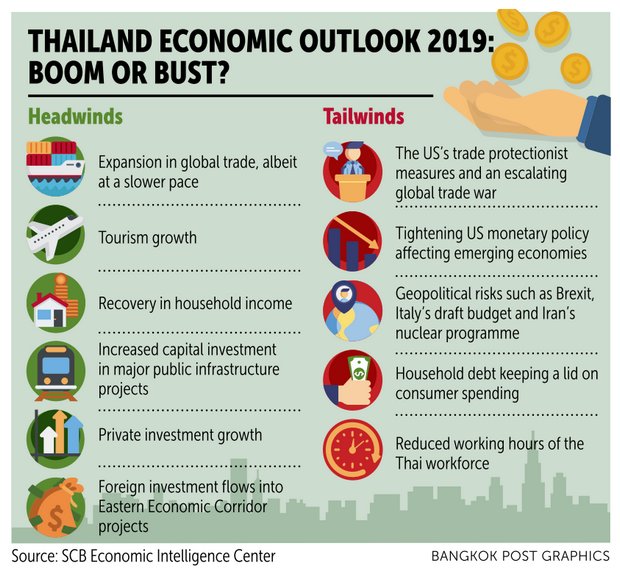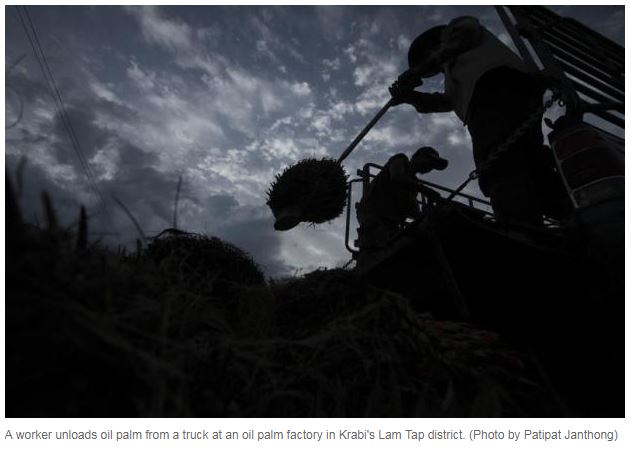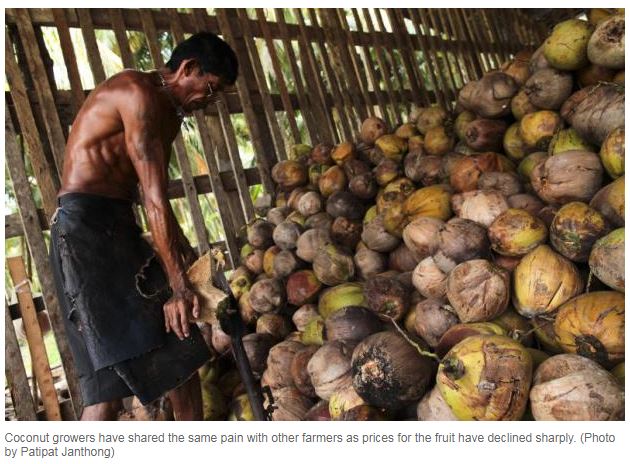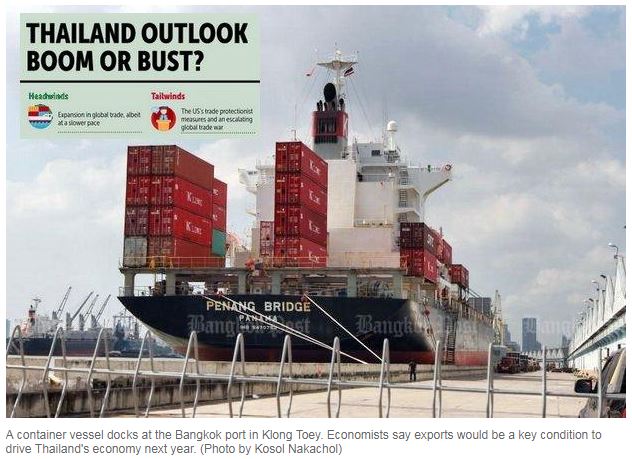Thailand: High-wire act for the economy
Although hopes remain high that the much-touted 2019 general election will be a catalyst jump-starting confidence among consumers and investors, the dream is marred by the reality that several economic tailwinds are keeping full-scale celebrations at bay.
Exports are braced for impact from the US-China trade war, while Thailand’s tourism industry is still reeling from the July boat accident that killed more than 40 Chinese visitors.
Reinforcing the gloomy outlook are fluctuations in global oil prices and domestic purchasing power. Thailand’s household debt also remains stubbornly high.
Democracy may or may not return to Thailand, but economic woes are a real possibility in the year to come.
TANGIBLE THREATS
Exports account for about 70% of Thailand’s GDP, filling the tummies and pockets of Thais in different social hierarchies.
Fears were stoked by the Commerce Ministry’s recent report that customs-cleared exports in September fell 5.2% year-on-year, fetching US$20.7 billion, after growing 6.7% in August, 8.3% in July, 8.2% in June and 11.4% in May.
The sagging Chinese economy, higher oil prices, rising interest rates and slowing global economic prospects all pose threats to the Thai economy next year.
Banjongjitt Angsusingh, director-general of the International Trade Promotion Department, said the department will adjust its export promotion plan this quarter if exports begin to slow.
The department will focus on food and agricultural product exports, for which Thailand has a strong production base and the potential to benefit farmers and local economies.
The department also aims to promote Thai rice in global markets through social media and trade fairs. In 2018, Thailand expects food export growth of 8% to copy9.8 billion.
Ms Banjongjitt said services are another sector with plentiful opportunities for Thailand to expand in global markets, highlighting restaurants, construction, decoration, spas, wellness, beauty services and digital content.
SAFETY STANDARDS NEEDED
The government is highly likely to impose plans to stimulate tourism business over the next two months and into next year, with fresh measures including visa-fee exemptions to restore a plunge in Chinese tourists.
 Despite disagreeing with the waiver of visa-on-arrival fees, Tourism and Sports Minister Weerasak Kowsurat said he would support other measures to boost tourist arrivals. He called on both the public and private sectors to help build confidence among travellers from the mainland before the high travel season arrives.
Despite disagreeing with the waiver of visa-on-arrival fees, Tourism and Sports Minister Weerasak Kowsurat said he would support other measures to boost tourist arrivals. He called on both the public and private sectors to help build confidence among travellers from the mainland before the high travel season arrives.
From his point of view, one urgent task should be salvaging the wrecked boat that capsized off Phuket on July 5, killing 47 Chinese tourists on board.
Salvage work is expected to be completed this week and will help authorities finalise the investigation of the disaster before an announcement is made to the public, Mr Weerasak said.
Tourism from China has slowed since the accident, down 12% and 15% in August and September.
But the minister is optimistic that the number of Chinese in the form of free independent travellers, accounting for 60% of total Chinese arrivals to Thailand, remains strong.
Mr Weerasak said earlier that waiving visa fees might not be the right solution to ease the problem. Rather, improvement of safety standards in tourist destinations is more vital to help reclaim tourist confidence, not only from mainland China but other countries as well, he said.
But the private sector has said that a visa exemption would be the best solution to draw back Chinese visitors.
Members of the Association of Thai Travel Agents, many of which operate inbound tour firms to bring Chinese to Thailand, have strongly demanded visa incentives for the remaining two months of the year.
Furthermore, they have requested that the government offer a multiple visa for a six-month entry period from November onwards for Chinese tourists to boost inbound arrivals.
During the first nine months of 2018, Thailand received 28.5 million international tourists, representing 8.7% year-on-year growth.
Tourists have generated income of 1.4 trillion baht, up 10.9% year-on-year.
RAMPING UP DISBURSEMENT
The Comptroller-General’s Department is confident that budget disbursement for this fiscal year will improve as state officials become familiar with the Fiscal Responsibility Act, which came into force on April 20, said director-general Suttirat Rattanachot.
She blamed a lack of understanding of the new law as the culprit for previous shortfalls of budget disbursement in meeting targets.
Budget disbursement for public investment in fiscal 2018 totalled 373 billion baht, or 56.5% of the total investment disbursement sum of 659.8 billion, down from 65.9% in fiscal 2017.
The government targeted 88% of last fiscal year’s investment budget to be doled out.
“Under the new law, I believe that the problems of how state officials do not understand taking out budget will decrease because the law has been in effect for a while,” Ms Suttirat said.
The Comptroller-General’s Department will propose that Finance Minister Apisak Tantivorawong change the approach in setting a budget target, particularly investment budget, for this fiscal year, which began Oct 1.
The new approach will be based on assessing the previous fiscal year with the highest investment budget disbursement ratio instead of setting a high target that is difficult to achieve, Ms Suttirat said.
 Fiscal 2017 saw the highest budget disbursement at 94% of the overall budget and 76% of investment budget.
Fiscal 2017 saw the highest budget disbursement at 94% of the overall budget and 76% of investment budget.
To ramp up budget disbursement, the Comptroller-General’s Department has set up 150 teams to handle taking out budget at all state agencies, she said.
The government’s recent instruction to have state agencies prepare the budget drawdown process since the lawmakers’ second reading of the fiscal 2019 budget will also help speed the disbursement process, Ms Suttirat said.
In normal practice, state agencies prepare to take out budget after the budget is published in the Royal Gazette.
The government has set the fiscal 2019 budget at 3 trillion baht, of which 2.26 trillion is regular budget and the remainder is allocated for public investment.
Dechapiwat Na Songkhla, the Budget Bureau director, estimates that 15-20% of the fiscal 2019 investment budget will be doled out during the October-to-December quarter and 20-25% in the following quarter.
STABLER OIL PRICES
Fluctuation in oil prices in 2019 will differ from the 2018 situation because geopolitical tensions and the trade war are expected to improve, says a veteran in the energy industry.
A decline in oil prices was one of the factors in the recent global stock sell-off, with Asian shares plunging in the wake of Wall Street’s biggest daily decline since 2011.
But energy expert Manoon Siriwan offers a hopeful outlook, saying the US sanctions imposed on Iran are expected to ease up, while the US-China trade row is likely to see improved negotiations.
 Saudi Arabia is also expected to raise its crude oil output. The Saudi energy minister recently stated that the country was ready to raise output to meet rising demand in the wake of several production disruptions in other countries, Mr Manoon said.
Saudi Arabia is also expected to raise its crude oil output. The Saudi energy minister recently stated that the country was ready to raise output to meet rising demand in the wake of several production disruptions in other countries, Mr Manoon said.
“Global oil prices in 2019 will be stabler than in 2018, but prices are expected to decline a bit next year,” he said.
Global oil prices have climbed gradually since July, with a 10% rise to $80 a barrel amid mounting geopolitical tensions. Prices are now hovering at a normal level in a range of $70-80 a barrel.
Thai Oil Plc, Thailand’s largest oil refiner, reported last week that oil prices had declined more than $5 per barrel within a week from $80 in the previous week.
West Texas Intermediate, a reference oil price, closed at $66.82 a barrel, down $2.31, while Brent crude fell $0.27 to $76.17.
The Dubai market price stood at $74.23, down copy.83 a barrel.
Singapore’s Platts Market price for refined oil, unleaded gasoline 95 closed at $80.99 a barrel, down $2.31, and high-speed diesel stood at $91.81 a barrel, down $2.66.
“Once global oil prices become higher than $90 per barrel, additional crude output will increase in line with the prices because drilling businesses will resume a good return on investment,” Thai Oil said.
Policymakers will implement an energy-saving campaign and consumers are expected to follow accordingly, Mr Manoon said.
Source: https://www.bangkokpost.com/business/news/1566274/high-wire-act-for-the-economy


 English
English




